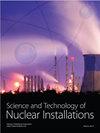Study on Airborne Radionuclide Dispersion in Floating Nuclear Power Plant under the Loss-of-Coolant Accident
IF 0.9
4区 工程技术
Q3 NUCLEAR SCIENCE & TECHNOLOGY
引用次数: 2
Abstract
Floating nuclear power plant is a kind of nuclear power plant on a barge moored specifically in an area of the sea. In order to study the factors influencing airborne radionuclide dispersion induced by the loss-of-coolant accident in floating nuclear power plant, the floating nuclear power plant platform was taken as the research object, and the dispersion of airborne radionuclide under combined conditions of platform positions, wind directions, and break directions (north, south, west, and east) was simulated by the CFD (computational fluid dynamics) method. The results show that northern and southern breaks have less dangerous island area than western and eastern ones but have more platform dangerous area than the western and eastern ones. The risk of the southern break is the greatest, and that of the western break is the least. Rotating the floating nuclear power plant platform in a certain angle can reduce the damage of loss-of-coolant accident. The effects of the dose received by the personnel under the condition of the severe accident were evaluated based on previous research, showing that the inhalation effective dose and the effective dose of plume immersion exposure were less than the radiation dose limit of 0.25 Sv within two hours in the accident. The results of the study can provide reference for the design of floating nuclear power plant platform and the formulation of emergency plan.冷却剂丢失事故下浮动核电站空气中放射性核素扩散的研究
浮动核电站是一种核电站在驳船上停泊在特定的海域。为了研究浮式核电站失冷事故引起的空气中放射性核素扩散的影响因素,以浮式核电站平台为研究对象,采用CFD(计算流体力学)方法对平台位置、风向、断裂方向(北、南、西、东)组合条件下的空气中放射性核素扩散进行了数值模拟。结果表明,南北断裂的危险岛屿面积小于东西断裂,而台地危险面积大于东西断裂。南部断裂的风险最大,而西部断裂的风险最小。将浮动核电站平台进行一定角度的旋转,可以减少失冷剂事故的危害。在前人研究的基础上,对严重事故条件下人员所受剂量的影响进行了评估,结果表明,事故中吸入有效剂量和烟羽浸泡暴露的有效剂量均小于事故中2小时内辐射剂量限值0.25 Sv。研究结果可为浮动核电站平台的设计和应急预案的制定提供参考。
本文章由计算机程序翻译,如有差异,请以英文原文为准。
求助全文
约1分钟内获得全文
求助全文
来源期刊

Science and Technology of Nuclear Installations
NUCLEAR SCIENCE & TECHNOLOGY-
CiteScore
2.30
自引率
9.10%
发文量
51
审稿时长
4-8 weeks
期刊介绍:
Science and Technology of Nuclear Installations is an international scientific journal that aims to make available knowledge on issues related to the nuclear industry and to promote development in the area of nuclear sciences and technologies. The endeavor associated with the establishment and the growth of the journal is expected to lend support to the renaissance of nuclear technology in the world and especially in those countries where nuclear programs have not yet been developed.
 求助内容:
求助内容: 应助结果提醒方式:
应助结果提醒方式:


